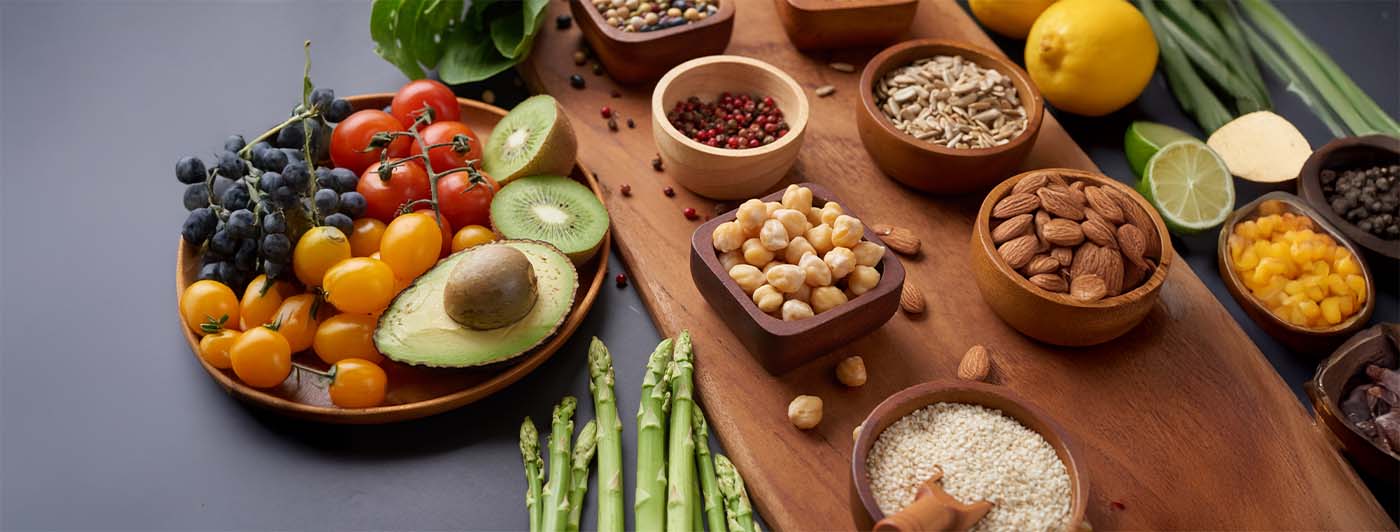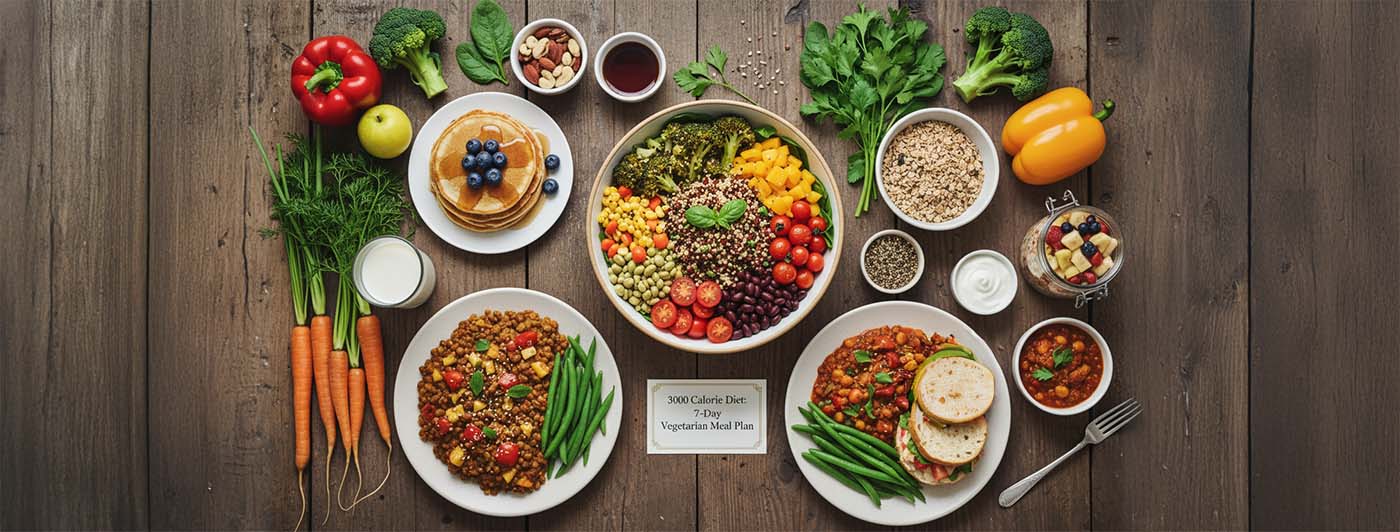Have you ever met someone who radiates energy, thinks clearly, and seems to age in reverse—all without eating fish or meat? Their secret might be a diet rich in vegetarian omega 3 foods.
In today’s fast-paced world, a balanced diet is key to lasting health and mental performance. Omega-3 fatty acids are vital nutrients, yet for those following a plant-based lifestyle, finding adequate vegetarian omega 3 sources can be tricky. The good news? Nature offers plenty of options rich in ALA (Alpha-Linolenic Acid)—a form of omega-3 that the body converts into EPA and DHA, known for supporting heart, brain, and joint health.
Even better, many of these omega-3 sources are also packed with plant protein, helping you build strength and resilience naturally.
This guide explores the top 10 vegetarian omega 3 foods you should add to your daily diet—plus simple, delicious ways to enjoy them every day.
Top 10 Vegetarian Omega 3 Foods
1. Flaxseeds
Flaxseeds are one of the richest vegetarian omega 3 sources known to humankind. Just one tablespoon of ground flaxseeds offers more than 2 grams of ALA, making them an excellent addition to your smoothies, oatmeal, or yogurt bowls. Grinding flaxseeds before consumption enhances nutrient absorption since their tough outer shell can pass undigested otherwise.
Besides omega-3s, flaxseeds also supply lignans (powerful antioxidants) and dietary fiber that promote heart health and digestion. Sprinkle them on salads or blend them into a morning smoothie for an easy daily boost.
2. Chia Seeds
Chia seeds are another compact superfood that packs high levels of vegetarian omega 3 fatty acids, fiber, protein, and calcium. When soaked, they form a gel-like consistency that aids digestion and keeps you full longer.
Interestingly, while most people associate chia seeds with weight loss, they can also be helpful for those seeking healthy mass gain. If you’re looking to increase calorie intake naturally, incorporating chia seeds for weight gain in smoothies or puddings is a great idea. These tiny seeds not only add healthy fats but also stabilize blood sugar levels throughout the day.
3. Walnuts
Shaped like a miniature brain, walnuts are a visual reminder of their benefits for cognitive health. They’re among the most convenient and delicious vegetarian omega 3 snacks. A handful of walnuts daily supports brain function, reduces inflammation, and helps manage cholesterol.
Walnuts also provide polyphenols—plant compounds that work synergistically with omega-3s to combat oxidative stress. For an added nutrition boost, blend crushed walnuts into smoothies made with a plant based protein powder to create a balanced snack rich in healthy fats and protein. Add them to your cereal, salads, or enjoy them as a mid-day bite to stay energized and mentally sharp.
4. Hemp Seeds
Hemp seeds contain an ideal 3:1 ratio of omega-6 to omega-3 fatty acids, which is considered optimal for human health. This balance makes them one of the best vegetarian omega 3 options for those looking to improve heart health and reduce inflammation.
In addition to essential fatty acids, hemp seeds deliver complete plant protein containing all nine essential amino acids—something rare in the vegetarian world. You can mix them into smoothies, sprinkle them over toast, or add them to homemade energy bars for a nutritional punch. Their mild, nutty flavor pairs beautifully with sweet or savory dishes.
5. Algal Oil
If you’re searching for a direct vegetarian source of DHA and EPA—the forms of omega-3s typically found in fish oil—look no further than algal oil. Derived from marine algae, it is a pure and sustainable vegetarian omega 3 supplement.
Unlike flax or chia seeds, algal oil bypasses the conversion process since it already contains active DHA and EPA. Regular consumption supports vision, heart rhythm, and cognitive health. You can find algal oil in capsule or liquid form, making it convenient for daily supplementation.
6. Seaweed
Seaweeds like nori, kelp, and spirulina offer both ALA and DHA in small quantities, making them unique vegetarian omega 3 sources. Beyond omega-3s, they’re loaded with iodine, antioxidants, and vitamin B12, which are vital for thyroid function and red blood cell production.
Adding seaweed to soups, sushi, or roasted snacks not only diversifies your palate but also enhances micronutrient intake. Spirulina, in particular, can be blended into smoothies as a natural energy booster and detoxifying agent.
7. Edamame
Edamame (young soybeans) and mature soybeans are versatile sources of vegetarian omega 3 and protein. These legumes can be consumed steamed, roasted, or blended into dips. They support heart health by lowering LDL cholesterol and increasing HDL levels.
Edamame pairs well with whole grains or salads, providing both protein and fiber. If you use tofu or tempeh made from soybeans, you’ll benefit from omega-3s while also meeting your daily protein targets naturally.
8. Brussels Sprouts
Brussels sprouts often get overlooked, but these mini cabbages are one of the few vegetables containing measurable amounts of vegetarian omega 3 fatty acids. When cooked lightly—steamed or sautéed—they retain their nutrients and deliver a host of health benefits, including improved insulin sensitivity and reduced inflammation.
To further enhance absorption, drizzle them with olive oil or toss with crushed flaxseeds. Combining them with other omega-3-rich foods can maximize the nutritional payoff.
9. Moringa Seeds
Native to India and Africa, moringa seeds have gained fame for their incredible nutrient density. Apart from being high in iron, calcium, and antioxidants, they also contain moderate levels of vegetarian omega 3 fatty acids. Traditionally used for detoxification and liver support, moringa seeds can be roasted or powdered into smoothies for a subtle earthy flavor.
Their nutritional profile complements other plant superfoods, making them ideal for anyone following a balanced vegetarian or vegan lifestyle.
10. Perilla Oil
Perilla oil, extracted from perilla seeds commonly used in Korean cuisine, contains up to 60% ALA, making it one of the most concentrated vegetarian omega 3 oils available. It’s often used as a finishing oil rather than for cooking since high heat can degrade its delicate fats.
A drizzle of perilla oil over steamed vegetables or soups enhances both taste and health benefits. Studies suggest it may improve cognitive function and reduce inflammatory markers, making it a valuable addition to your diet.
How to Optimize Your Vegetarian Omega 3 Intake
While incorporating these foods is a great start, here are a few tips to ensure maximum benefit from your vegetarian omega 3 diet:

-
Combine different sources – Mix seeds, nuts, and algae-based oils for balanced ALA, DHA, and EPA intake.
-
Use fresh and unheated oils – Flaxseed and perilla oils lose potency when heated; use them raw in salads or smoothies.
-
Balance omega-6 intake – Reduce refined oils like sunflower or corn oil that can compete with omega-3 absorption.
-
Add Vitamin D-rich foods – Since vitamin D supports calcium absorption and immunity, include vitamin d indian food sources such as fortified dairy alternatives, mushrooms, and sunlight exposure.
-
Ensure iron sufficiency – Complement your omega-3 diet with hemoglobin rich fruits like pomegranate, guava, and dates to maintain optimal blood health.
The Role of Omega-3s in a Healthy Lifestyle
Omega-3 fatty acids are essential for heart rhythm regulation, reducing inflammation, and supporting mental health. Regular intake of vegetarian omega 3 foods can also improve skin elasticity, joint flexibility, and metabolic function.
When combined with other lifestyle factors—like hydration, quality sleep, and balanced exercise—the benefits multiply. For instance, consuming drinks to reduce belly fat such as green tea, lemon water, or apple cider vinegar before meals can help manage weight and improve digestion.
For fitness enthusiasts, tracking macronutrients using a protein intake calculator ensures you’re meeting your body’s recovery needs. Incorporating plant protein sources like lentils, peas, and quinoa provides essential amino acids that complement omega-3 fatty acids for muscle growth and repair. Those looking for convenient nutrition can explore plant based protein powder or pea protein powder options to bridge dietary gaps without relying on animal products.
Combining Omega-3s with Other Nutrient-Dense Foods
A well-rounded diet doesn’t rely on one nutrient alone. To amplify your vegetarian omega 3 intake, pair these foods with others rich in micronutrients and antioxidants.
-
Alkaline fruits such as kiwi, mango, and papaya help neutralize body acidity, promoting better nutrient absorption.
-
Include creatine rich foods like pumpkin seeds and peanuts for improved energy during workouts.
-
Superfoods like moringa, spirulina, and flax combine well with green smoothies or salads, making your meals both flavorful and functional.
When your diet features a variety of colors, textures, and nutrients, your body receives everything it needs for energy, resilience, and vitality.
A Sample Day of Omega-3-Enriched Vegetarian Eating
-
Breakfast: Oatmeal topped with ground flaxseeds, chia pudding, and sliced banana.
-
Mid-Morning: A handful of walnuts and a green smoothie with spinach, moringa powder, and almond milk.
-
Lunch: Quinoa bowl with edamame, Brussels sprouts, and a drizzle of perilla oil.
-
Evening Snack: Seaweed chips or roasted chickpeas.
-
Dinner: Tofu stir-fry with hemp seeds and side of mixed vegetables sautéed in olive oil.
-
Before Bed: Warm almond milk with cinnamon and a teaspoon of flaxseed oil.
This balanced plan provides healthy fats, protein, and antioxidants—ensuring your vegetarian omega 3 goals are met while supporting overall wellness.
The Takeaway
Adopting a vegetarian omega 3-rich diet is one of the most empowering choices you can make for lifelong health. These ten foods—from flaxseeds and chia to algal oil and perilla—offer clean, plant-based ways to boost your nutrition and energy naturally.
Pairing them with a complete plant protein source—like Plantigo plant protein—takes your wellness to the next level. Designed for clean nutrition and everyday performance, it complements your omega-3 intake perfectly.
So as you plan your meals, go beyond just eating right—fuel your body consciously. Add your daily dose of vegetarian omega 3, combine it with Plantigo’s plant protein, and feel the difference clean nutrition can make.
Start your journey toward balanced, powerful living—one clean choice at a time.
Frequently Asked Questions
1. What are the best vegetarian omega 3 sources?
The best vegetarian omega 3 sources include flaxseeds, chia seeds, hemp seeds, walnuts, algal oil, and perilla oil. These foods provide ALA, which the body converts into EPA and DHA for heart and brain health.
2. Can I get enough omega-3 without eating fish?
Yes, absolutely! A well-balanced plant-based diet rich in vegetarian omega 3 foods like chia, flax, and algal oil can meet your body’s needs. Pairing them with plant protein sources enhances nutrient absorption and overall wellness.
3. How much omega-3 should vegetarians eat daily?
Adults generally need around 1.1–1.6 grams of ALA omega-3 per day. You can get this easily by adding 1 tablespoon of ground flaxseeds or chia seeds to your meals.
4. Is algal oil better than flaxseed oil for omega-3?
Both are great, but algal oil provides direct DHA and EPA—the active forms of omega-3—while flaxseed oil offers ALA, which your body must convert. Vegetarians often use both for complete omega-3 support.
5. Can omega-3 help with skin and brain health?
Yes! Regular intake of vegetarian omega 3 foods supports smooth, hydrated skin, sharp mental focus, and reduced inflammation. It’s a natural way to look and feel your best every day.












